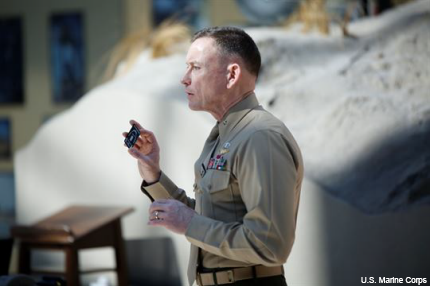Navy fills new top post for unmanned systems
Navy Secretary Ray Mabus taps retired Marine Corps Brig. Gen. Frank Kelley to be the deputy assistant secretary for the Navy’s unmanned systems.

Kelley, the commander of the Marine Corps Systems Command, speaks at a conference in February 2014.
In a long anticipated announcement, Navy Secretary Ray Mabus has named retired Marine Corps Brig. Gen. Frank Kelley as the Navy’s first-ever deputy assistant secretary for unmanned systems. Mabus made the announcement at the Unmanned Systems Defense Conference on Tuesday hosted by the Association for Unmanned Vehicle Systems International.
Kelley’s appointment follows the appointment in June of Rear Adm. Robert Girrier as the services first director of unmanned warfare systems and the creation of the N99 directorate, which will oversee development of the Navy’s unmanned systems, including air, surface and undersea vehicles.
In his prepared remarks, obtained by Defense One, Mabus said Kelley’s “superb operational experience as a U.S. Marine, as well as his professional expertise in the field of electronic warfare and unmanned technology make him perfectly qualified to lead this new enterprise in the Department of the Navy, and I look forward to the great work he and his team will be spearheading.”
Both the creation of the N99 directorate and the deputy assistant post were lauded recently by Vice Adm. Joseph Aucoin, deputy chief of Naval Operations for Warfare Systems for placing all things unmanned “under one hat” for better synergy.
“My goal in creating the DASN for Unmanned Systems was to streamline our current programs and drive a strategy for development that is deliberate and thoughtful,” Mabus said. “Currently, our various communities—air, sea, undersea and ground—are all doing incredible work on their unmanned systems and integrating them into the existing architecture within their own framework, but as this technology becomes more complex and widespread, ensuring we have a cohesive management function is critical to maintaining our superiority across all domains, and possibly even multiple domains.”
The creation of the new posts and directorate underscore the growing importance of unmanned systems in naval operations. Mabus praised the performance of a wide array of systems both currently in the Navy’s operational arsenal and in the development pipeline, including the Fire Scout rotary wing and ScanEagle small UAS—both of which have been deployed to Iraq and Afghanistan as well as the East Africa to make up for intelligence, surveillance and reconnaissance shortfalls, according torecently leaked government documents provided to The Intercept.
Mabus also talked about the KMAX unmanned helicopter’s successful run in Afghanistan and touched on the Broad Area Maritime Surveillance-Demonstrator, which is the Navy’s current high-altitude ISR platform based on the Global Hawk. However, the MQ-4C Triton, the Air Force’s Global Hawk maritime variant will soon be fielded. Ssyetms in the pipeline include the Low-Cost UAV Swarming Technology, or LOCUST project, the Large Displacement Unmanned Undersea Vehicle, the small UAS Blackjack, which will see its maiden deployment in fiscal 2016 and the X-47B Salty Dog.
The X-47B was the demonstration platform for the Navy’s Unmanned Carrier-Launched Airborne Surveillance and Strike program or UCLASS, which has been subject to significant setbacks. One of the largest setbacks concerns the debate over whether the program would consist of mainly surveillance with limited strike capability or mainly strike with limited surveillance capability.
Mabus has previously expressed frustration with the delays in the program. “We’ve had [a request for proposal]…ready to go for a year and a half/two years now, and it’s been held up because of a look at overall ISR systems,” Mabus said at an event at the American Enterprise Institute. “I don’t know if the Navy sees UCLASS as ISR … That’s certainly one role, but it’s got a lot more roles … One of the reasons we’d like to go ahead and get the RFP out, is that we’d like to find out what’s available out there in industry.”
NEXT STORY: Keith Alexander's cyber startup draws backing



